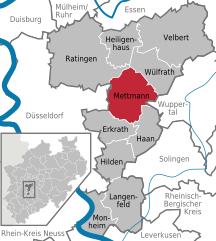Mettmann
Mettmann | |
|---|---|
 | |
Location of Mettmann within Mettmann district  | |
| Coordinates: 51°15′N 6°58′E / 51.250°N 6.967°E | |
| Country | Germany |
| State | North Rhine-Westphalia |
| Admin. region | Düsseldorf |
| District | Mettmann |
| Government | |
| • Mayor (2020–25) | Sandra Pietschmann[1] |
| Area | |
| • Total | 42.52 km2 (16.42 sq mi) |
| Elevation | 125 m (410 ft) |
| Population (2022-12-31)[2] | |
| • Total | 39,134 |
| • Density | 920/km2 (2,400/sq mi) |
| Time zone | UTC+01:00 (CET) |
| • Summer (DST) | UTC+02:00 (CEST) |
| Postal codes | 40822 |
| Dialling codes | 02104 |
| Vehicle registration | ME |
| Website | www.mettmann.de |
Mettmann (German: [ˈmɛtˌman] ⓘ) is a town in the northern part of the Bergisches Land, in North Rhine-Westphalia, Germany. It is the administrative centre of the district of Mettmann, Germany's most densely populated rural district. The town lies east of Düsseldorf and west of Wuppertal.
History
Located on the ancient trade route "strata coloniensis" the
In 1363 Mettmann was one of eight administrative
In 1806 Mettmann became a part of the
However, the Prussian rulers did not prove to be very popular, as during the bread-riots of 1848–49 and the ensuing political upheavals, which hit the district of Düsseldorf among the hardest, policing was done from Berlin, excluding local accountability. Thus, the Prussian government regarded the Rhinelands as more of a colony, furnishing the bureaucracy, which was based in Düsseldorf, with civil servants that were drafted in from other regions of Prussia.
Mettmann was liberated from the
Demographics

In the years following Germany's loss of World War II in 1945, Mettmann saw significant population increases driven mostly by the resettlement of citizens previously living in the eastern territories that had been ceded to Poland. Having seen almost no war-time destruction and being situated in a traditionally strong economic region, the town soon prospered, in line with a general period of rapid economic growth that acquired the moniker Wirtschaftswunder (economic miracle).
A shortage of industrial workers led to several recruitment campaigns in
Due to festivals and other events that took place in Mettmann to which many Brazilians were flown in, the town also became the host of a sizeable Brazilian community, this fact was also featured in the German movie Samba in Mettmann by the German/Italian filmmaker duo Hape Kerkeling and Angelo Colagrossi.[3]
Government and politics
Mettmann gave its name to the District of Mettmann. Although the administrative centre of the District of Mettmann changed often over the years, in 1954 the parliament of the Land North Rhine-Westphalia eventually decided to make Mettmann the district's administrative centre. In 1974–75, with the administrative boundary reform, the district lost several councils to the neighbouring cities Düsseldorf, Duisburg, Essen, and Wuppertal. The district name also changed from Düsseldorf-Mettmann to Mettmann during this reform. However, the regional Board of Inland Revenue—the "Finanzamt Düsseldorf-Mettmann"—serves both the municipalities forming the district of Mettmann, as well as the city of Düsseldorf proper.
Sites of interest

In the nearby
- Neanderthal
- Historical downtown with central market, mansions typical black slate lining
- Town Museum
- Goldberger Mill in Mettmann Stadtwald
Notable people
- Konrad Heresbach (1496–1576), reformer, Calvinist, humanist and educator
- Joachim Neander (1650–1680), Church teacher, theologian and hymn writer
- Johannes Flintrop (1904–1943), Roman Catholic critic
- Thomas Huber (born 1955), a Swiss artist, lived and worked here
- Kristina Bach (born 1962), singer and music producer
- Frank Kschischang (born 1962), Electrical Engineering Professor at University of Toronto
- Campino (born 1962), a German-British singer, lived here
- Martin Kaymer (born 1984), golfer
Twin towns – sister cities
 Laval, France (1974)
Laval, France (1974)
Friendly cities
Mettmann also has friendly relations with:[4]
 Żnin, Poland (1997)
Żnin, Poland (1997) Goražde, Bosnia and Herzegovina (1998)
Goražde, Bosnia and Herzegovina (1998) Markranstädt, Germany
Markranstädt, Germany
References
- ^ Wahlergebnisse in NRW Kommunalwahlen 2020, Land Nordrhein-Westfalen, accessed 21 June 2021.
- Landesbetrieb Information und Technik NRW. Retrieved 20 June 2023.
- ^ "Samba in Mettmann", Internet Movie Database, accessed 17.06.2017
- ^ a b "Partnerstädte, Patenschaften und Freundschaften". mettmann.de (in German). Mettmann. Retrieved 2021-02-25.
External links
- Homepage of the City of Mettmann (in German)
- Homepage of the District of Mettmann (in German)
- Homepage of the Neanderthal museum (in English)





